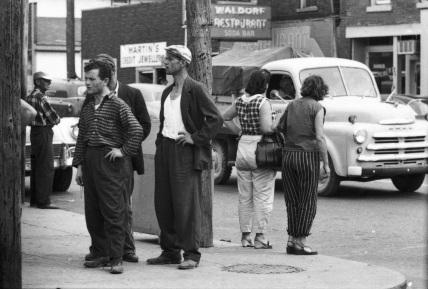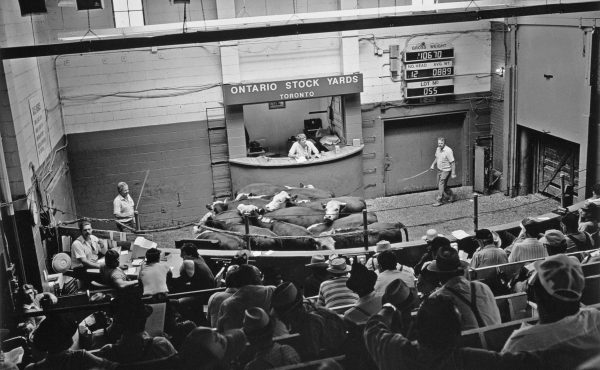I caught one of the NFB 70th Anniversary retrospectives Saturday afternoon that featured three short films from the NFB vault — “Streetrailway Switchman,†“Corral,†“Nails†— and one longer piece, “The Back-breaking Leaf.†All explore communities of labour in Canada. Shot in the 50s, 50s, 70s and 50s respectively, they are fundamentally optimistic portraits of busy times, hungry men in a country hungry for hard work.
“Street-Railway Switchman,†the first of the batch, introduces us to a Polish immigrant who’s job tending the streetcar tracks on Winnipeg’s windswept North Main thoroughfare has left him with wistful but happy. He works alone, shoveling almost invisibly in the wintry night while people on the streetcars doze and wait for the car to start up again. The next morning he sits in a diner with a pile of sausages and 6 hard-boiled eggs. “It’s not hard,†he tells us of the job, “and I eat a lot of fat.â€
“Corral†might very well be an Ian Tyson song — one of the happier ones. Again, the worker is singular, solitary, and satisfied. This unnamed cowboy — no words at all in this one — trots around a pen guiding wayward horses with grace and calm. A guitar strums some Western ballad and the tall-grasses blow. Unapologetically romantic, but it works. The Alberta setting is beautiful. The sky looms vast over-head. The cowboy opens the gate and the horses burst free. End picture.
“The Backbreaking Leaf†is the main event — an award winning work directed by Terence Macartney-Filgate in 1959. Here, we witness the perennial transformation of tiny Delhi (pronounced: “Del-Hiâ€) ONT as it is flooded by summer laborers to work the Tobacco fields. Men lurch through the field in the dewy morning heat, gathering leaves. “You break your back to get the leaves,†the narrator explains, “because a machine hasn’t been invented to harvest the [crop].†And this isn’t a bad thing. Again the theme is of perseverance: work is tough but so are people. One guy from North Carolina says Canadians are a pretty nice bunch too. As long as the evening meals are satisfactory, people are content. Hungarian Immigrants set up their beer gardens and mud-speckled farm women gossip about doing nails on their day off.
It’s tempting, but nothing feels propagandistic here. If so much of the Hot Docs catalogue promises to expose shit jobs and exploited labourers and abusive industries — and rightly so — these period pieces offer pleasant interruptions. And no, those weren’t simpler times — these are just simpler film projects. The camera lens seems less troubled here — by what’s beyond the frame of a corral, — than it will, say, the chrome walls of a contemporary Oil Sands Buyer’s Convention (more on that later). So the narrator of “Backbreaking Leaf†can say of Boomtown Delhi, “You work hard, make your money, and get out†without any presentiment of alcoholism and infrastructural ruin.
More ambivalent is “Nails†— a 1979 colour piece shot in the wet glow of a nail foundry. Here the machines do the work, pumping and spinning irresistibly as workers watch for quality control. These indoor scenes are juxtaposed to moonlit landscape of wheat fields and a silent stone barn. The message is unclear. Can creative destruction be contained in those factory walls? Is that farm, frozen in time, gone for good?


